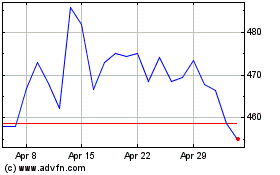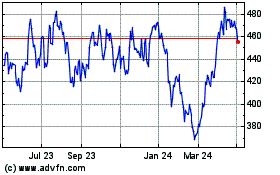Former Glencore Oil Trader Pleads Guilty to Manipulating Prices
March 24 2021 - 7:49PM
Dow Jones News
By Aruna Viswanatha
A former oil trader at mining company Glencore PLC pleaded
guilty Wednesday to conspiring to manipulate fuel prices, in a case
that signals a new front in a long-running crackdown by prosecutors
on efforts to improperly steer oil trading benchmarks that
influence real-world prices.
Appearing via videoconference from his lawyers' offices in
California, the ex-trader, Emilio Jose Heredia Collado, admitted to
allegations that accused him of working to manipulate an oil-price
benchmark by directing other traders to submit orders that would
push prices in the direction he wanted. "Guilty," Mr. Heredia said
when asked how he wished to plead to the one count of conspiracy
that prosecutors had charged him with. The case against Mr. Heredia
related to trading through a process managed by oil-price benchmark
publisher S&P Global Platts.
At the brief Zoom hearing before U.S. District Judge Charles
Breyer in San Francisco, Assistant U.S. Attorney Matthew Sullivan
said that Mr. Heredia was cooperating in the government's ongoing
investigation.
He faces up to five years in prison, but he could face less than
that if the government determined he had offered substantial
assistance, the judge noted. Prosecutors said Mr. Herdedia, 49
years old, worked to engineer benchmark prices between 2012 and
2016 that would improve the profitability of other transactions in
physical fuel oil.
The case echoes claims previously investigated in Europe and
targets conduct first revealed by The Wall Street Journal in 2013,
in an article that showed traders admitting they could manipulate
prices on the Platts system.
A Glencore spokesman said previously the company has cooperated
with the continuing federal investigation, and S&P Global
Platts has said it maintains a transparent methodology that allows
it to publish assessments that reflect market value.
Trades made during the daily "Platts window" -- the final 30 to
45 minutes of trading -- are reported by traders to Platts editors,
who determine a value at the end of the day.
The Justice Department's fraud section, which is prosecuting Mr.
Heredia, has steadily stepped up its oversight of commodity trading
and other markets that were lightly policed and mostly unregulated
until the 2008 financial crisis. The allegation that traders
manipulated a reference price in global oil markets mirrors those
in past cases finding that bank traders colluded to rig
interest-rate and foreign-exchange benchmarks.
Benchmark prices in the physical oil market are derived from
information volunteered by traders, since trading is done in
private and buyers and sellers aren't required to publicly report
prices. The benchmarks are then used around the world to set prices
for other purchases and sales of physical oil.
In one example cited by prosecutors, Mr. Heredia in 2016
directed a co-conspirator to submit offers to Platts during the
pricing window for a low-grade fuel known as "bunker" at the port
of Los Angeles. The other trader subsequently lowered the price
more than 40 times to push down the Platts benchmark, according to
prosecutors.
The goal was to lower the price so the company could buy fuel
oil more cheaply from another firm, prosecutors wrote in their
charging document.
The activity had the effect of moving down the price from an
average of $245 a metric ton to a final price of $204.50 a metric
ton, "resulting in an unlawful gain of hundreds of thousands of
dollars" for his employer, prosecutors said.
Write to Aruna Viswanatha at Aruna.Viswanatha@wsj.com
(END) Dow Jones Newswires
March 24, 2021 19:34 ET (23:34 GMT)
Copyright (c) 2021 Dow Jones & Company, Inc.
Glencore (LSE:GLEN)
Historical Stock Chart
From Mar 2024 to Apr 2024

Glencore (LSE:GLEN)
Historical Stock Chart
From Apr 2023 to Apr 2024
